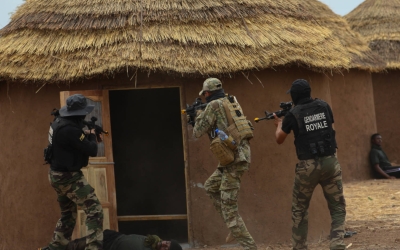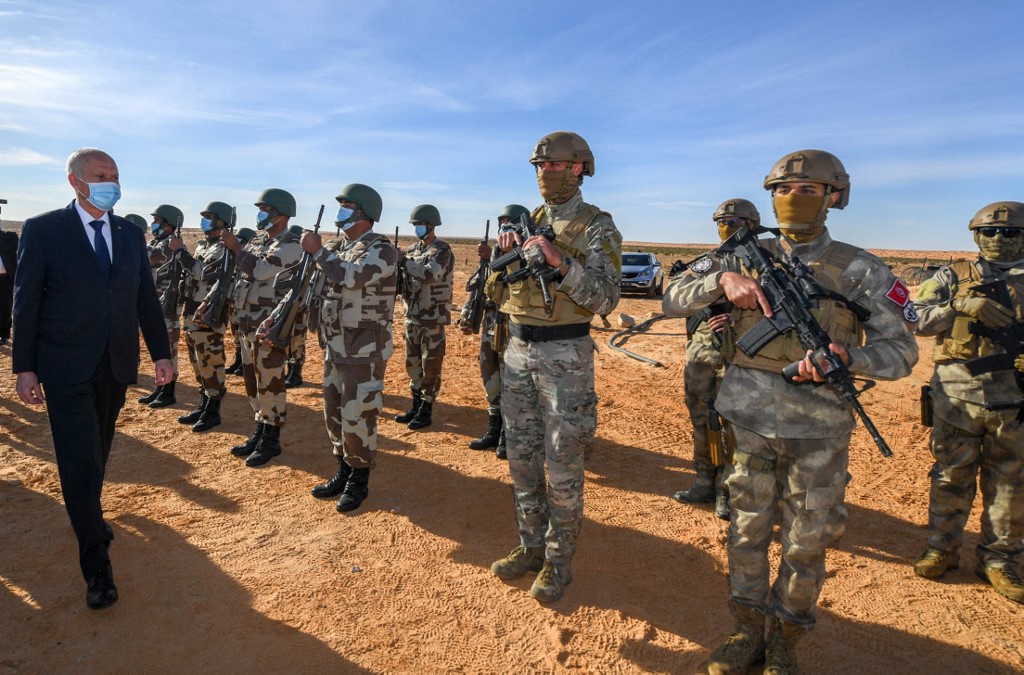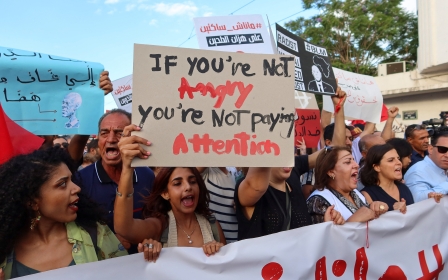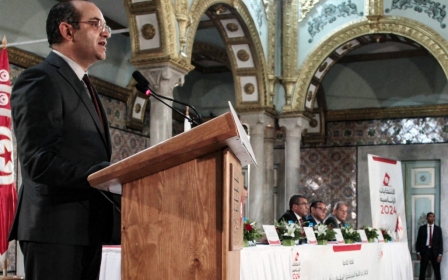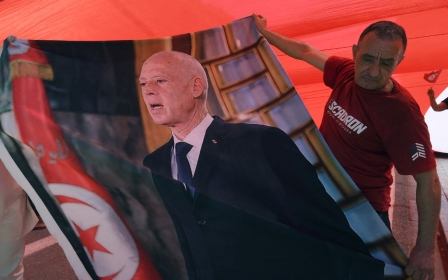Tunisia: Army's role in politics raises alarm ahead of presidential election
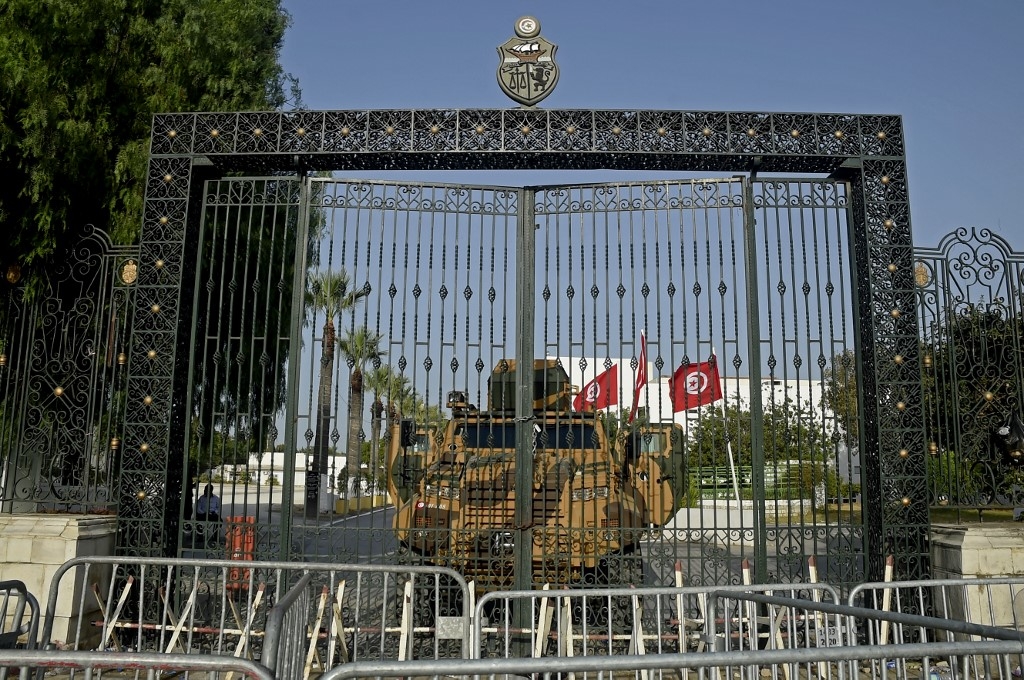
After being marginalised under Presidents Habib Bourguiba and Zine el-Abidine Ben Ali, then gaining popularity during the 2011 revolution as the "guarantor of democracy", the Tunisian army has seen its political power grow significantly since Kais Saied's accession to the presidency.
After his election in 2019, the president sought to win the favour of the military. Without which he would not have been able to carry out his power grab in July 2021.
Since then, he has increased the influence of the army in the country's political life, to the extent of giving ministries to high-ranking officers, a first in the country's history.
On the eve of a presidential election that was largely described as unfair, this development worries many observers, who wonder about the role that the army could play in the short term.
Unlike other countries in the region, such as Algeria, Libya, Egypt or Syria, the Tunisian army is not a political-economic actor.
New MEE newsletter: Jerusalem Dispatch
Sign up to get the latest insights and analysis on Israel-Palestine, alongside Turkey Unpacked and other MEE newsletters
As soon as the country's independence in 1956, Bourguiba insisted on confining soldiers to their barracks.
A lawyer by profession and not a military man - unlike most Arab leaders - the first Tunisian president was more influenced by the French political model than by the systems resulting from military putsches.
This conviction was reinforced when Bourguiba escaped, in 1962, an attempted coup d'etat involving high-ranking officers.
In 1987, he was eventually dismissed by a former military man, his Prime Minister Ben Ali.
Under the latter's rule, the military remained essentially marginalised and seen as a threat, as illustrated by the so-called Barraket Essahel case in 1991, where the president accused 244 military men of "conspiring against state security".
The situation changed after the revolution that led to the fall of Ben Ali.
Among its founding myths, the story of "the Man Who Said No" helped popularise the army.
'More than the logistical role assigned to it, the army was seen as a protector of democracy'
- Kamel Jendoubi, former human rights minister
Blogger and future MP Yassine Ayari, son of a high-ranking officer, announced at the height of the revolutionary movement in January 2011 that the army chief of staff, General Rachid Ammar, had disobeyed Ben Ali by refusing to shoot at the demonstrators.
A few months later, Ayari admitted to having lied about Ammar, who in reality never disobeyed, but the army continued to enjoy popularity in Tunisia.
Beacause of this, the deployment of soldiers in large cities was generally well received by Tunisians, who associated the exactions under Ben Ali with the police institution instead.
The post-revolutionary decade saw the role of the army strengthen.
In addition to its involvement in maintaining order, the military institution, unanimously praised by the ruling classes, was involved in the organisation of elections.
"More than the logistical role assigned to it, the army was seen as a protector of democracy," Kamel Jendoubi, human rights minister from 2015 to 2016, told MEE.
"By posting soldiers in front of polling stations and then ensuring the transport of ballot boxes, we sent the message to voters that the army was the guarantor of the electoral process and the popular will," Jendoubi, who presided over the first electoral authority between 2011 and 2012, added.
The army's rise in power
But it was the army's role in the fight against the wave of attacks that hit Tunisia between 2011 and 2016 that ensured it a central role in public life.
In 2013 and 2014, two attacks targetting soldiers in Mount Chaambi affected public opinion.
Subsequently, successive governments and presidents significantly increased the military budget, with the help of Western partners, chiefly the United States, which consider the Tunisian army as an interlocutor of choice.
The weapons used by the army are mainly American, and Washington provides significant military aid to Tunisia. The most recent example is the supply of two Textron C-208EX reconnaissance aircraft at the beginning of September.
In addition, Tunisia has been a major non-NATO ally since 2015 and, starting during the Bourguiba era, senior military officials have been trained in France and the United States, particularly within the framework of the United States Africa Command (USAFRICOM).
"The increase in the army's resources has allowed the entire military institution to upgrade," journalist Ahmed Nadhif told MEE.
"The military, from the bottom up, has seen its financial situation improve. This has allowed wealthier groups to join the army."
Nadhif explains that in order to effectively combat the threat of attacks, entire areas - including those where civilian populations reside - are now under military control, such as in the governorate of Kasserine, around Mount Chaambi and in the southeast, towards the Libyan border.
According to the journalist, "between 2011 and 2021, government coalitions underestimated the weight of the army, mainly seeking to control the interior ministry."
This can be due to the fact that the scenes of anarchy that accompanied the revolution led to a kind of militarisation of minds, which notably saw politicians from both the majority and the opposition call for the intervention of the army in civilian life.
For example, to put an end to a long social movement in a hospital in Sfax in 2015, under the presidency of Beji Caid Essebsi, a member of the military was appointed head of the facility.
Furthermore, during that decade, few political actors denounced the prosecution of civilians before military courts for their opinions, after complaints made by the defence ministry for "undermining the morale of the army".
'Republican discipline'
Elected in 2019, Saied endeavoured to court the army, including by increasing presidential visits to military barracks.
He also began using the army to stifle dissent, dragging some of his critics before military courts, although being a civilian himself.
'The increase in the army's resources has allowed the entire military institution to upgrade'
- Ahmed Nadhif, journalist
Three months before his 2021 takeover, Saied proclaimed himself head of all the civilian and military armed forces. While the 2014 constitution attached the police to the head of government, Saied took advantage of the absence of a constitutional council to subjugate all internal security forces.
It was with this newfound dominance that Saied carried out what has been dubbed a "constitutional coup" on 25 July 2021, which could only have been achieved with the help of the armed forces.
When Saied announced his "exceptional measures", namely the freezing of parliament, the lifting of MPs' immunity and the dismissal of the head of government, he was surrounded by senior officials from the interior and national defence ministry.
Military tanks were also dispatched to block access to the parliament building .
Then, while Saied worked at weakening counterpowers, such as the press, NGOs and the justice system, he further strengthened the army by increasing its budget.
According to many observers, his power today is essentially due to the support of the military, and his popularity has been put into doubt by the low turnout of the various elections he convened.
As a result, several elements suggest that the political weight of the army has indeed increased under Saied.
The most obvious expression of this is the appointment, for the first time in Tunisian history, of two military personnel to ministerial positions, namely public health in October 2021 and agriculture in January 2023.
As the current governance system is particularly obstuse, it is difficult to explain the balance of power within it and to know who, between Saied and the army, has the upper hand.
"Saied is giving more autonomy to the army. He is aware of the limits that he must not cross with the military institution and that could threaten his power," Colin Powers, senior fellow and chief editor at the Paris-based think tank Noria Research, told MEE.
However, significant friction has emerged in recent months.
According to specialised website Africa Intelligence, military intelligence conducted investigations that led to the arrests of people close to a protege of Saied, the all-powerful justice minister Leila Jaffel.
'Saied is giving more autonomy to the army. He is aware of the limits that he must not cross with the military, and that could threaten his power'
- Colin Powers, Noria Research
Turbulence also appeared between Saied and his military ministers. Africa Intelligence reports disagreements on strategic issues such as the shortage of medicines, which the president explained by "machinations".
The most remarkable confrontation concerned the issue of water shortages. While the agriculture minister justified summer water cuts with rational explanations such as years of drought and the state of pipes, Saied disavowed the military man by alluding, as is his habit, to plots against Tunisians.
The disagreement is likely to explain the major cabinet reshuffle carried out by Saied at the end of August, where the two military ministers were ousted.
Another senior army officer, general Mustapha Ferjani, was however appointed health minister, "by way of compensation" for these dismissals, according to several media outlets.
The most recent tensions have been caused by the presidential election set for 6 October. While Saied is accused of preventing other candidates from running, some military personnel have reportedly shown their disapproval of the arrest of some "republican" political figures who do not threaten public order.
The army's statutes require it to protect the republican form of the state, Jendoubi explained.
"Until now, by following Saied in his coup, the military could say they were playing their role. Indeed, the president is the head of the armed forces and he was democratically elected in 2019," the former minister told MEE.
In an op-ed in Le Monde newspaper about the role of the army in the upcoming election, Jendoubi stressed on its role as guardian of democracy and wrote that the institution had to decide between supporting pluralism and choosing authoritarianism.
"The situation is radically different in 2024. Will republican discipline, respectful of the people's choice, be able to make sense if the 6 October election turns into a denial of democracy?" he told MEE.
Middle East Eye delivers independent and unrivalled coverage and analysis of the Middle East, North Africa and beyond. To learn more about republishing this content and the associated fees, please fill out this form. More about MEE can be found here.


